Every year at News Corp Australia we recognise the stories of incredible Australians with our Pride of Australia medals. Here we celebrate our recipients from Victoria.
MICHAEL GALLUS
Medallist
Giving kids a sporting chance
When teacher Michael Gallus hit 40 and had his midlife crisis, he didn’t buy a red sports car or run off with his secretary — he started the charity Footys4All instead.
Starting five years ago in his garage, Gallas his since delivered more than 15,000 footballs to underprivileged children around the country.
“I’ve seen the power of sport and the opportunities that arise,” he says.
“Sport speaks to youth in a language they understand. It can create hope where once there was only despair. It’s more powerful than race, religion, government in breaking down barriers.
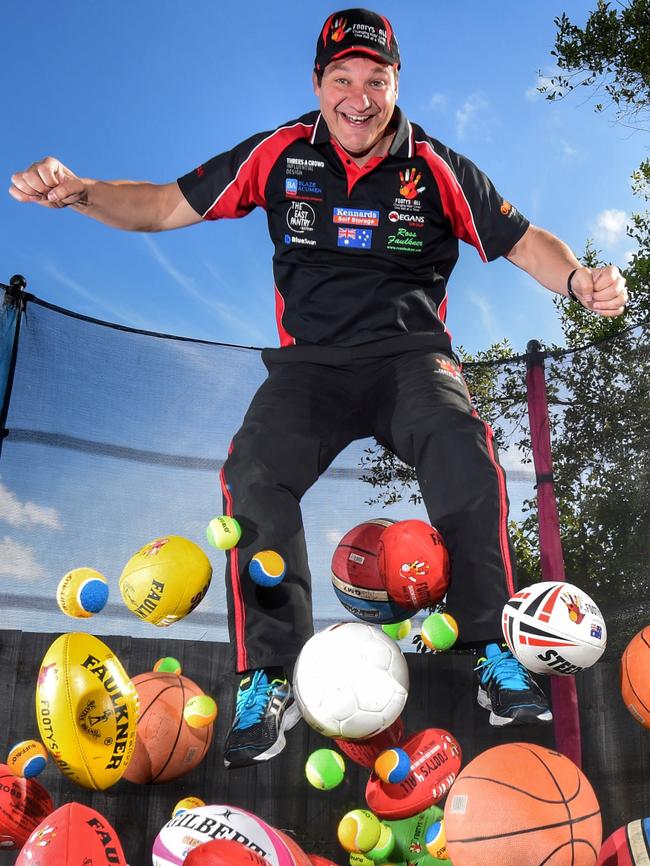
“Kids love playing with balls — you can break down barriers by just turning up with a soccer ball even if you don’t speak the language.”
With that in mind, Gallus set about putting together a network of volunteers and sponsors to get the balls to far-flung corners of Australia and beyond. He approached ball manufacturers Ross Faulkner (Aussie rules), Gilbert (rugby union) and Steeden (rugby league) for the equipment. Transport giant TNT happily agreed to transport them.
And, most importantly he put a call out to communities in need through word of mouth and social media.
Through his teaching position at Essendon Grammar, Gallus also met big names who were vital in spreading the word to those who most needed it.
“I was lucky enough to teach Michael Long’s son, Jake, when he was a young fella and got to know Michael through that,” Gallus says.
“I approached him to be involved and he said ‘sure, how can I help?’
“Of the 15,000 balls we have distributed around Australia probably about 10,000 have gone to remote and indigenous communities and that’s through the support of Michael Long.”
Gallus also coached the children of renowned psychiatrist, Professor Patrick McGorry, the 2010 Australian of the Year. When asked, McGorry gladly came on board too, and, along with AFL greats Long and Lance Franklin, and Wallaby Quade Cooper, is a Footys4All Ambassador.
“Patrick McGorry understands the power of improving your mental health through sport and physicality and learning about working as a team and those life skills you get through playing sport and interacting with a simple ball,” Gallus says.
The initial focus of Footys4All was sending balls to underprivileged and remote indigenous communities, where it has been a roaring success in places. But now the program has expanded to meet the needs of struggling children around the world.
The charity has sent soccer balls to HIV stricken youth in Africa and the detention centres on Manus Island, rugby balls to remote Fiji islands, even tennis balls to special needs children in India. They have also gone to prisons, juvenile justice centres, and impoverished villages.
“Sport speaks to youth in a language they understand. It can create hope where once there was only despair.” Footys4All cuts through
Gallus says it’s not just the practical gift of a ball that helps create change, it’s also about bringing hope to children who may be doing it tough.
“They are just so appreciative that someone cares about them enough to give them that gift of a ball but it’s also the gift of hope,” he says.
“That’s the most powerful emotion you can give anyone.
“A lot of these kids come from dysfunctional families and are doing it tough. To have someone come in as a Footys4All volunteer, distribute a ball, spend some time with them and say ‘you’re doing it tough but keep your chin up, there are thousands of people behind the scenes that care about you and want to give you this gift’. Then when we go they still have that as a reminder people care about them.”
Just how Gallus makes it all work is a mystery but he says he’s thankful for the unstinting support of his wife, Amanda, and their three children. In addition to his teaching job and the charity he also coaches his son’s basketball team and last year started a girls’ Aussie rules team too.
“You make the time, don’t you?,” he says of his frantic lifestyle.
“I don’t sleep much — I run 16-18 hour days. But I stopped drinking and I changed my lifestyle and started to exercise and eat properly and use those great people and great stories for inspiration to get this done.”
There’s been a cost. In order to get Footys4All up and running Gallus sold his car and maxed out his credit cards.
“I would do it 10 times over again to get where we have got today and more importantly to get where we are going to in the next five years,” he says.
“The goal next year is to distribute 20,000 balls. The goal the year after to distribute 80,000 balls.
“Our goal is to get to one million kids in poverty in Australia, then to go around the world to distribute 10 million balls over the next 10 years. Wherever there’s a disadvantaged kid who and needs some hope and support then we are out to get them.”
— James Wigney
-
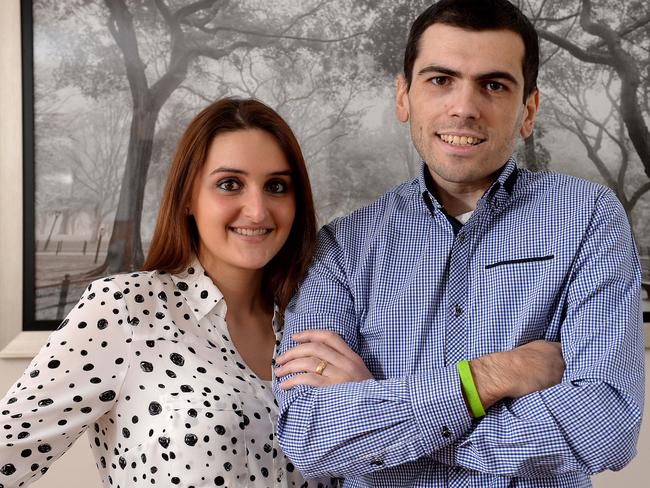
JONATHON TARASCIO
Medallist
Easing cancer’s financial burden
Non-smoking, non-drinking Jonathon Tarascio’s diagnosis of Hodgkin’s lymphoma at 25, just four months after getting married, was “just bad luck” according to doctors.
Along with his wife Liza, Tarascio founded The Green Button Foundation, which aims to reduce financial worries created by burdens such as child care costs, home assistance and pharmacy bills. The foundation has raised more than $100,000 since its inception last year.
At 30, Tarascio’s own prognosis remains unclear but he vows to continue to fight for the welfare of others in his position, including for the availability of new drugs and additional research funding.
-
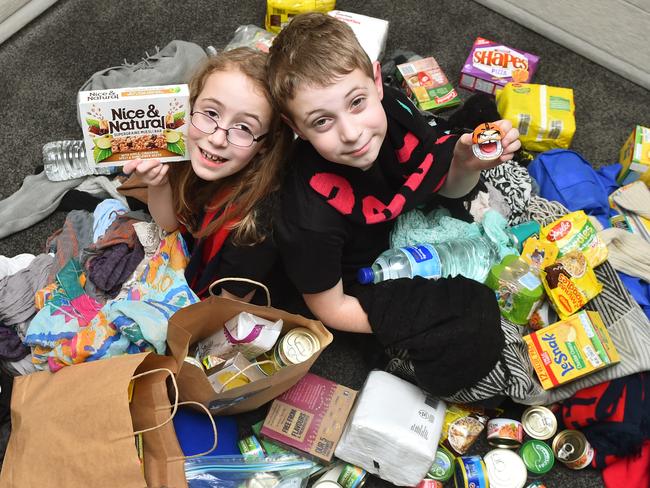
STEPHANIE AND HAYDEN RUJAK
Medallists
Delivering hope to the homeless
An eye-opening American holiday inspired siblings Stephanie and Hayden Rujak to try and improve the plight of Melbourne’s homeless.
For the past two years, Hayden, 9, and Stephanie, 7, have spent weekends helping those sleeping rough on the streets in and around the CBD, delivering food, clothing, blankets and essential care packages to those in need.
Hayden became concerned about the issue of homelessness on a recent holiday to the US, after witnessing the extent of the problem.
“I had had enough and told mum and dad I wanted to do something about it,” he says. “I have a goal one day to see no more homeless people in Melbourne.”
-
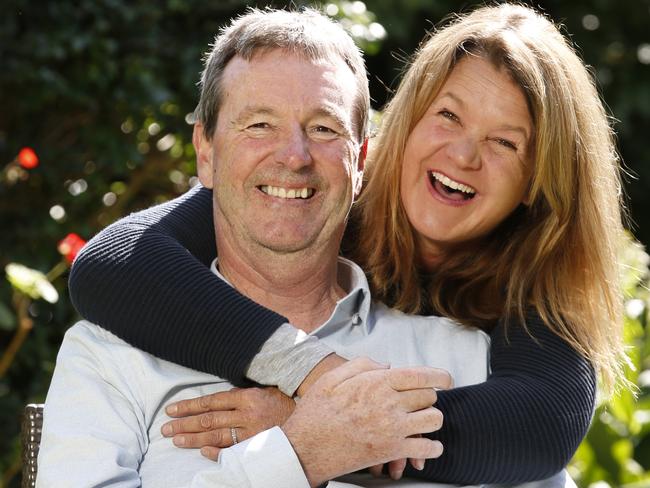
NEALE DANIHER
Medallist
Building a lifesaving legacy
When AFL great Neale Daniher was diagnosed with motor neurone disease in 2013 he was given just three years to live.
Vowing to fight to the end, the ex-Essendon player and Melbourne coach used his fame to increase awareness of the disease and raise funds for research. Daniher’s Big Freeze at the G event has garnered more than $5 million towards research for a cure over the past two years and Daniher himself remains an inspiration for those battling the disease.
“We’re on the ropes and taking a hiding, but plenty of people are in our corner and eventually we’re going to hit back,” he said recently. “From hopelessness, now there’s hope.”
-
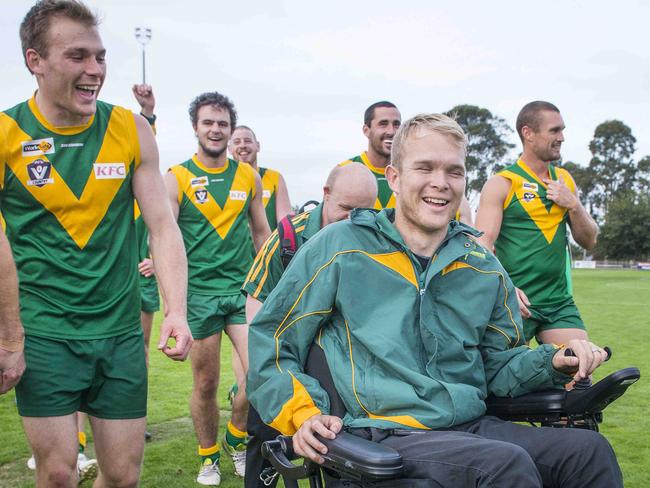
BEAU VERNON
Medallist
Defying all the odds
A football accident at 23 resulted in Beau Vernon becoming a quadriplegic, but it hasn’t prevented the former champion from living life to the full.
Vernon has become an inspiration to others in a similar condition as well as the Aussie Rules community. Against the odds Vernon, a C5/6 quadriplegic with no feeling or movement from the chest down, has learned to live a life of independence.
Vernon drives a modified car, has graduated from university, and coached his former side the Leongatha Parrots to the grand final for two seasons.
To help encourage other quadriplegics, he posts YouTube videos illustrating his triumphs.
-
SIMON COSTA
Medallist
Solving world hunger
As managing director of the Southern Hemisphere’s largest horticultural and supply-chain companies, the Costa Group, Simon Costa was going places in the corporate world.
So when he quit to volunteer for the UN for what he thought would be a six-month stint four years ago, his friends and family thought he was crazy.
“To step away and take myself over to these areas of difficulty, people were either genuinely concerned about my welfare or they thought it was just a phase and I’d get over it in a month and cycle back in,” Costa says of the reactions of family and friends.
“Maybe I would have if I hadn’t been able to get involved in something that can really make a difference.”
“The first reaction is shock — what do you mean the impact is this great and the solution is potentially this simple?” On solving a global problem
And make a difference he has. When Costa initially volunteered for the UN it was to identify inefficiencies in supply chains bringing relief to the starving and malnourished peoples of Africa. Moving through the region, he was shocked to discover an even bigger problem — the amount of food that is grown but never consumed.
Starvation and malnutrition are the biggest causes of death in the world, but it occurred to Costa a lack of food wasn’t the major cause, rather archaic farming and handling techniques, saw crops spoiling before they could reach the people intended. It was, he says the “world’s greatest solvable problem”.
Costa figured if he could teach the local farmers how to preserve their crops using a combination of handling, drying and storage techniques and simple technology then not only would they be able to feed themselves, they could progress from being subsistence farmers to small businesses.
If they reduced their losses and stored effectively they would have produce to sell all year round, which in turn could pay for things we take for granted such as education, clothing and basic medicine.
Costa and his team started with a trial of 1000 farms and the results were astonishing. He scaled up to 16,000 farms, then 45,000 with similar results, backed by a report that said crop losses had been reduced by 98 per cent. Soon he had big-hitting backers including World Bank, USAID, and the Bill and Melinda Gates Foundation.
He says: “The first reaction is shock — what do you mean the impact is this great and the solution is potentially this simple?
“The second stage they get angry — what the hell have they been doing with all the money we give them? And the third one is always — what do you need, this is such a slam dunk, what can we do to help?”
— James Wigney
-
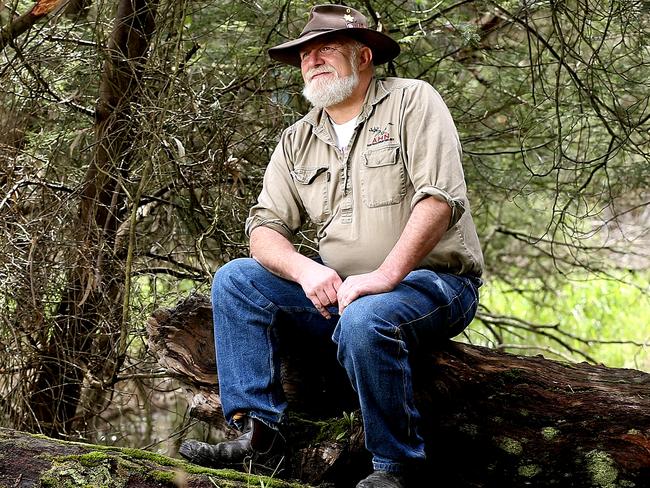
PAUL BANNAN
Medallist
Giving life to a stranger
Paul Bannan’s selfless act in donating his kidney to a complete stranger, began a ‘kidney exchange’ with six other donors and seven transplant recipients.
Originally, Bannan had offered to help a good friend in need. Having quit smoking, lost weight and gone on a fitness regimen to give the operation the best chance of success, Bannan was off the hook when his mate received an anonymous donor kidney.
“By that stage I said I was going to do it, so I stuck to that,” Bannan says of his decision to continue with donation regardless.
“People say I got nothing in return but I got a sense of achievement from the fact I was able to help.”
-
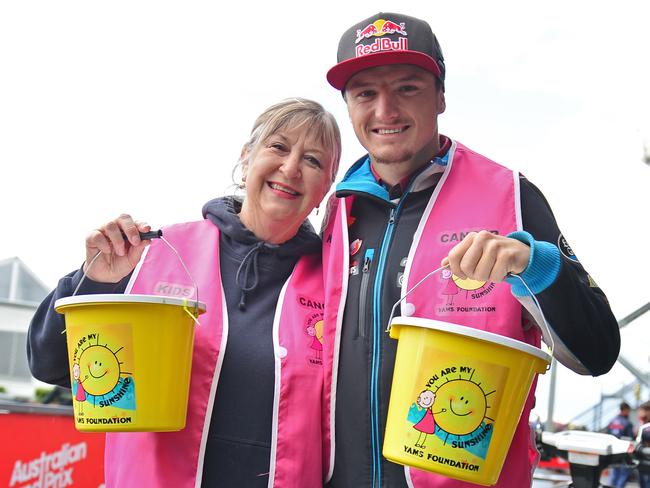
JUDE DONAHOO
Medallist
Million-dollar fundraiser
After losing her granddaughter Khalilla to neuroblastoma — a cancer common in infants and very young children — seven years ago, Phillip Island’s Jude Donahoo kicked into high gear.
Donahoo established charity foundation You Are My Sunshine (YAMS) in 2009 which has raised close to one million dollars for research towards a cure.
And those funds have resulted in significant breakthroughs. YAMS research not only increased the survival statistic from 25 per cent to 50 per cent but has provided new therapies for children with the disease.
With Donahoo set to retire, she hopes to break the million mark shortly.
-
KATE AUSTIN
Nominee
Sharing the wealth
Kate Austin is a bit like a modern day Robin Hood, with a cheeky, charitable twist and a whole lot of toiletries.
The 35-year-old — who was nominated for a Pride of Australia Award — pinches scented spoils from hotels to give to the needy. And if you’ve ever nabbed shampoo or snaffled soap, you’re a candidate for Austin’s charity, Pinchapoo.
“Each product directly impacts a life,” Austin says. “Money gets lost in that grey area. This is a direct, tangible donation with a feel-good factor.”
Pinchapoo has distributed over 790,000 products to 51 organisations since 2009. They support all types of organisations, Austin says, including women’s jails and men’s shelters, and have expanded their reach from Victoria to the east coast and Perth.
Pinchapoo’s supporters, amusingly dubbed the Poo Army, are dedicated.
If Austin puts out a request for toothbrushes, “we’ll come back to the office and find there are 4000 or 6000 toothbrushes waiting for us,” she says.
“You’re not actually donating shampoo, you’re donating dignity.” Pinchapoo has a ripple effect
Toothbrushes are the most wanted hotel products but deodorant is also gold, and shampoo and conditioner are used in most care packages.
Packages sent to each charity are customised for their patrons but no matter the product it can mean more than just a one-off clean.
Some charities use the packs to entice people in need to meet.
“There's a short-term housing facility in North Melbourne that takes in men off the streets for six to 12 weeks and pretty aggressively tries to rehabilitate them,” Austin says.
“The only way they can encourage them to come in is to pick up a toiletry bag. It’s actually about beginning the self-work and building the confidence to say ‘yes, I deserve this’ and to feel good and to smell good.”
In addition, toiletries help the men feel confident and “more likely to join a conversation” or ask for help.
Project Respect, an organisation which supports women in the sex industry, also uses their products.
“They use our bags so they can interact with the girls and see how they’re tracking,” she says.
“You’re not actually donating just shampoo, you’re donating dignity.
“It was never about giving people a shower, it was about how does that clean shower affect their day? Does it mean they go for that job interview or reach out for help?”
Austin speaks from experience. After years in a volatile family environment, she left home armed with just a toothbrush.
She walked 10km to her first boyfriend’s home where his family accepted her, but she longed for her own clothes and deodorant, along with a sense of stability.
It led to a tough school experience and bouts of low self-esteem but she says she’s also oddly “grateful” for it.
“I’ve always wanted to help people and prove that I’m better than what people expected of me,” Austin says.
— Jennifer Dudley-Nicholson
-
Heroes honoured
Watch our medallists receive their well-deserved awards in the video below.
-


Here’s what you can expect with tomorrow’s Parramatta weather
As spring moves into summer what can locals expect tomorrow? We have the latest word from the Weather Bureau.
Here’s what you can expect with tomorrow’s Parramatta weather
As spring moves into summer what can locals expect tomorrow? We have the latest word from the Weather Bureau.